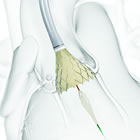|
Key Data Highlights:
“Low-risk aortic stenosis patients have unique characteristics due to their tendency to be younger and more active than their higher-risk counterparts,” said Michael Reardon, M.D., cardiothoracic surgeon at Houston Methodist DeBakey Heart & Vascular Center, principal investigator and senior author of the Evolut Low Risk Trial. “These data suggest that not only did TAVR match the gold standard of surgery, but it demonstrated statistical superiority across several key endpoints, including quality of life and hemodynamics – important considerations for severe aortic stenosis patients who may be more active.” The Evolut TAVR system is not approved in any geography for use in patients considered to be at a low risk of surgical mortality. These new data will need to be submitted to government regulators to support the safety and effectiveness of this device for this use. It is estimated that 165,000 low risk patients suffer from severe aortic stenosis per year in the U.S., Western Europe and Japan. If left untreated, it can cause heart failure in as little as two years. “Technological advances in the Evolut TAVR platform, including recapturability and repositionability coupled with its supra-annular valve design, have contributed to positive hemodynamic outcomes, which we continue to see with the Evolut platform across large-scale, randomized clinical trials,” said Pieter Kappetein, M.D., Ph.D., vice president and chief medical officer for the Structural Heart and Cardiac Surgery businesses, which are part of the Cardiac and Vascular Group at Medtronic. The global, prospective, multi-center, randomized Evolut Low Risk Trial evaluated three valve generations (CoreValve™, Evolut™ R and Evolut™ PRO valves) across a variety of valve sizes in more than 1,400 low risk severe aortic stenosis patients deemed to have a low mortality risk with surgery with a predicted risk of mortality of less than three percent. “These groundbreaking clinical trial results are positive for patients and heart teams alike and add to the growing body of clinical evidence that will help define the future of TAVR,” said Nina Goodheart, vice president and general manager of the Structural Heart business at Medtronic. “We now have positive results from a wide range of patients with severe aortic stenosis across the surgical risk spectrum, and we hope to see that more patients will have the opportunity to receive this therapy option down the road.” Following the launch of the self-expanding CoreValve System in the U. S. in 2014, the CoreValve Evolut R System became the first-and-only recapturable and repositionable TAVR device approved in the U.S. for severe aortic stenosis patients at a high or extreme risk for surgery in 2015. The Evolut R system received CE (Conformité Européene) Mark for intermediate risk severe aortic stenosis patients in 2016. In 2017, the third-generation Evolut PRO TAVR system was approved in the U.S. and Europe for extreme-, high- and intermediate-risk patients. The Evolut PRO valve features an outer tissue wrap that adds surface area contact between the valve and the native aortic annulus to further advance valve sealing. In collaboration with leading clinicians, researchers and scientists worldwide, Medtronic offers the broadest range of innovative medical technology for the interventional and surgical treatment of cardiovascular disease and cardiac arrhythmias. The company strives to offer products and services that deliver clinical and economic value to healthcare consumers and providers around the world. Analyst and Investor Briefing About Medtronic Any forward-looking statements are subject to risks and uncertainties such as those described in Medtronic's periodic reports on file with the Securities and Exchange Commission. Actual results may differ materially from anticipated results. Source: Medtronic plc |


